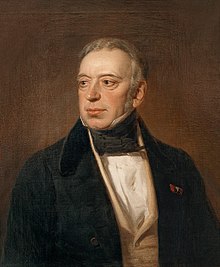Salomon Mayer von Rothschild
This article has multiple issues. Please help improve it or discuss these issues on the talk page. (Learn how and when to remove these messages)
|
Salomon Mayer von Rothschild | |
|---|---|
 | |
| Born | Salomon Mayer Rothschild 9 September 1774 |
| Died | 28 July 1855 |
| Occupation(s) | Banker, art collector, philanthropist |
| Title | Freiherr |
| Board member of | S M von Rothschild de Rothschild Frères |
| Spouse | Caroline Stern |
| Children | Anselm von Rothschild Betty von Rothschild |
| Parent(s) | Mayer Amschel Rothschild Gutlé Schnapper |
Salomon Mayer Freiherr[1] von Rothschild (9 September 1774 – 28 July 1855) was a Frankfurt-born banker in the Austrian Empire and the founder of the Austrian branch of the prominent Rothschild family.
Family
[edit]Born as Salomon Mayer Rothschild in Frankfurt am Main, he was the third child and second son of Mayer Amschel Rothschild (1744–1812) and his wife, Gutlé Schnapper (1753–1849).
In 1800, he married Caroline Stern (1782–1854). They had the following children:
- Anselm von Rothschild (1803–1874), who married his cousin Charlotte Nathan Rothschild in 1826.
- Betty von Rothschild (1805–1886), who married her uncle James Mayer de Rothschild in 1824.
His father had built a hugely prosperous banking business in Germany. Wanting to expand the family business across Europe, the eldest Rothschild son remained in Frankfurt, while each of the other four sons were sent to different European cities to establish a banking branch. Salomon was made a shareholder of the de Rothschild Frères bank when it was opened in Paris by his brother James Mayer de Rothschild in 1817.[citation needed]
Endogamy was an essential part of the Rothschild family's strategy for future success in order to ensure that control of their businesses remained in family hands. Therefore, in 1824, Salomon's daughter Betty married her uncle James Mayer de Rothschild, head of the Paris bank.[citation needed]
Career
[edit]Trained in finance and with years of experience, Salomon was sent in 1820 to Austria to formalize the family's existing involvements in financing Austrian government projects. In the same year, 1820, he established S M von Rothschild in Vienna. The business financed the Nordbahn rail transport network, Austria's first steam railway, and also funded various government undertakings where large amounts of capital had to be raised. He made connections amongst the country's aristocracy and its political elite through Prince Klemens von Metternich and Friedrich von Gentz.[citation needed]
Under the direction of Salomon, the Viennese bank was highly successful, playing an integral role in the development of the Austrian economy. In recognition of his services, he was raised to the Austrian nobility in 1816 by Emperor Francis I, the patent being offered to all five brothers, although declined by Nathan Mayer Rothschild.[citation needed]
In 1822, Salomon von Rothschild, along with his four brothers, was further honoured when the Emperor awarded him the hereditary title of Freiherr (German for 'Baron').[citation needed] In 1843, Salomon Freiherr von Rothschild became the first Jew to ever be given honorary Austrian citizenship.[citation needed]
Salomon's personal wealth was enormous, and he acquired extensive properties and made investments in art and antiquities. Despite the fact that he made substantial contributions to philanthropic causes, the concentration of vast wealth by the few members of the Austrian elite resulted in a growing civil unrest in the country.[citation needed]
By the time of the revolutions of 1848 in the Habsburg areas, anti-Rothschild sentiments were frequently being voiced and written about in broadsheets such as Ein offener Brief an Rothschild. With the fall of Metternich, Salomon lost some of his political clout and his bank a considerable amount of money.[citation needed]
Under pressure, the 74-year-old handed over the reins of the bank to his son Anselm, but it was not without rancor. He left Vienna and retired to Paris, where he died in 1855. From his art collection, some of the objets d'art from the Italian and French Renaissance, together with 18th-century works, were donated to the Louvre, including two paintings by Carlo Dolci.[citation needed]
See also
[edit]- Rothschild banking family of England
- Rothschild banking family of France
- Rothschild banking family of Naples
References
[edit]Sources
[edit]- The Rothschilds; a Family Portrait by Frederic Morton. Atheneum Publishers (1962) ISBN 978-1568362205 (1998 reprint)
- The Rothschilds, a Family of Fortune by Virginia Cowles. Alfred A. Knopf (1973) ISBN 978-0297765387
- Rothschild: The Wealth and Power of a Dynasty by Derek Wilson. Scribner, London (1988) ISBN 978-0684190181
- House of Rothschild : Money's Prophets: 1798-1848 by Niall Ferguson. Viking Press (1998) ISBN 978-0140240849
- The House of Rothschild (vol 2): The World's Banker: 1849-1999 by Niall Ferguson. Viking Press (1999) ISBN 978-0670887941
External links
[edit]- International center in London for research into the history of the Rothschild family, rothschildarchive.org; accessed 15 June 2017.
- Objets d'Art donated to the Louvre, insecula.com; accessed 15 June 2017.
- 1774 births
- 1855 deaths
- 18th-century German businesspeople
- 18th-century Austrian businesspeople
- 19th-century Austrian businesspeople
- Austrian art collectors
- Austrian bankers
- Austrian expatriates in France
- Philanthropists from Vienna
- Barons de Rothschild
- Businesspeople from Vienna
- German emigrants to the Austrian Empire
- Stern family (banking)
- Businesspeople from the Austrian Empire
